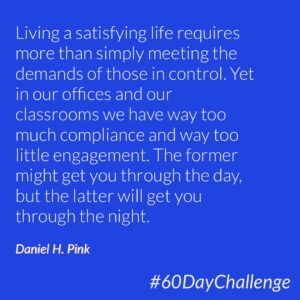 Think about your most memorable, powerful learning experience. Did it take place in a formal school setting—K12 or college? Did it take place in an informal setting–tinkering with ideas or stuff? What was the role of adults? Peers? Why is the experience so memorable?
Think about your most memorable, powerful learning experience. Did it take place in a formal school setting—K12 or college? Did it take place in an informal setting–tinkering with ideas or stuff? What was the role of adults? Peers? Why is the experience so memorable?
What might be if all of the learning experiences were candidates for the descriptors of memorable and powerful? Is this just utopian thinking or is it possible to transform the current learning experience for most people–young and old?
In his 2011 book, Drive: The Surprising Truth About What Motivates Us, Daniel Pink suggests we should consider three research-based motivators:
- Autonomy – Self-direction is a natural inclination.
- Mastery – We want to get better at doing things, and progress is a natural motivator.
- Purpose – What’s something greater than yourself? What will get you out of bed in the morning?
Now think back to that memorable learning experience… Whether a teacher designed it, or you yourself designed an informal experience, how much does autonomy, mastery and purpose contribute to the experiences meaningfulness?
—–
❓ Provocations:
How might education become more human-centered if we reframed the role of teacher from content disseminator to learning experience designer? What might be the impact on learner motivation if teachers designed (memorable and powerful) learning experiences through the lenses of autonomy, mastery and purpose?
How might we begin changing this mindset–this reframe of teacher–in teachers and leaders?
💎 Resource:
The puzzle of motivation – Daniel Pink’s TED talk
🧠 Mindsets:
Teacher as learning experience designer.
💡 Areas:
Learning
📣 Drop your thoughts in the comments, or in the Facebook group, and feel free to share resources. 🔥🔥🔥
- A silver lining - January 22, 2022
- Is our use of tech working against us? 🤔 - September 8, 2021
- What’s NOT going to change in the next 10 years? 🤔 - September 7, 2021